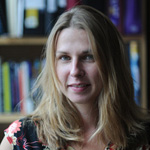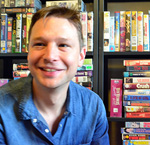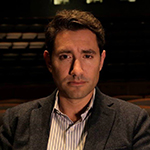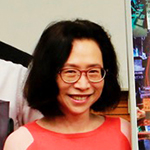Editors
Editorial Staff
The editorial staff manages the administrative and editorial operations of the journal. This includes selecting, reviewing, and editing open call submissions as well as book, resource, and other reviews.
Managing Editor
Kevin Sanson, Queensland University of Technology
Kevin Sanson is Senior Lecturer of Entertainment Industries in the Creative Industries Faculty at Queensland University of Technology. He also is a Chief Investigator of the Digital Media Research Centre. Previously, he was the Research Director of the Carsey-Wolf Center’s Media Industries Project at the University of California, Santa Barbara. He is co-editor of Precarious Creativity: Global Media, Local Labor (UC Press 2016), Voices of Labor: Creativity, Craft, and Conflict in Global Hollywood (UC Press 2017), and Connected Viewing: Selling, Streaming, and Sharing Media in the Digital Era (Routledge 2014). He’s published in International Journal of Cultural Studies, Television and New Media, and Popular Communication, among others. His book project examines working conditions in global production hubs. He currently serves as the journal’s managing editor.
Graduate Editorial Assistant
D. Bondy Valdovinos Kaye, Queensland University of Technology

D. Bondy Valdovinos Kaye is a PhD student from the United States at Queensland University of Technology. His research interests include digital music, music industry research, media law and policy, and media in South-east Asia. His current work explores copyright and music in Myanmar and the new screen ecology in India. He has presented papers at the 12th and 13th World Media Economics and Management Conference and the Association for Education in Journalism and Mass Communication Conference. Bondy also is an avid jazz musician, formerly the drummer and bassist of Parallel Path.
Review Editors
Nedda Ahmed, Georgia State University
Nedda Ahmed, MLS, is Arts Librarian at Georgia State University. She has nearly fifteen years of experience providing research assistance to scholars in cinema and media studies. Ms. Ahmed is the author of book reviews as well as a book chapter on designing effective research guides. She has taught several half-day workshops on librarianship for film, television, and media industries.
Shady Patterson, Georgia State University
Shady Patterson is a PhD student in the Moving Image Studies Program at Georgia State University. She teaches Film History and Race and Representation at GSU and is interested in studying popular culture through ideas of visibility. In 2012, shady graduated from New York University’s Visual Culture program and moved to Atlanta to work in Film & TV. Shady is co-founder of Trapbone: A Caffeinated Studio; has worked as a curatorial assistant at The Atlanta Contemporary, an independent curator with LiFT Art Salon, and as a costumer at Tyler Perry Studios. She is also one-half of the creative duo theradicals, a global performance collective based in Atlanta. Shady’s greatest accomplishment is her newborn daughter, Windy Oya Radical.
Editorial Collective
The editorial collective provides strategic leadership to the journal, focusing especially on editorial policies and long-term growth. Editorial and administrative responsibility for the journal’s special sections rotates among the different members of the editorial collective.
Amelia Arsenault, Georgia State University

Amelia Arsenault is an Assistant Professor of communication at Georgia State University. She also serves as a research fellow at the USC Center on Public Diplomacy and the Media and Democracy Research Fellow at the Center for Global Communication Studies at the Annenberg School for Communication, University of Pennsylvania. Dr. Arsenault’s work on global media ownership has appeared in edited volumes and in journals such as Information, Communication, & Society, International Sociology, and the International Journal of Communication. Her current book project explores the nascent industry of businesses offering online media advocacy services. She is also a member of the Atlanta Media Industries Project, a research collective dedicated to studying the evolving media ecology of Atlanta. Prior to her academic career, she served as the film coordinator for the Zimbabwe International Film Festival Trust, a non-profit arts and culture organization dedicated to promoting visual literacy in Zimbabwe.
Christian Christensen, Stockholm University
Stuart Cunningham, Queensland University of Technology

Stuart Cunningham is Distinguished Professor of Media and Communications, Queensland University of Technology, and Director of the Australian Research Council Centre of Excellence for Creative Industries and Innovation. He has played a leading role in the development of Australian film and television history and analysis; in the articulation of policy into media and cultural studies; and in shaping the debate and impact of the creative industries agenda in Australia and internationally. He was elected as an inaugural fellow in Cultural and Communication Studies in the Australian Academy of the Humanities, and has served in several leadership roles in advocacy, advice and governance in research and higher education, and in the screen and library sectors. His most recent books are Digital Disruption: Cinema Moves Online (edited with Dina Iordanova, 2012), Key Concepts in Creative Industries (with John Hartley, Jason Potts, Terry Flew, John Banks and Michael Keane, 2012), and Hidden Innovation: Policy, Industry and the Creative Sector (2013).
Michael Curtin, University of California, Santa Barbara

Michael Curtin is the Duncan and Suzanne Mellichamp Professor of Global Studies in the Department of Film and Media Studies at the University of California, Santa Barbara. He is also Director of the 21st Century Global Dynamics Initiative. His books include Playing to the World’s Biggest Audience: The Globalization of Chinese Film and TV, The American Television Industry, and Precarious Creativity: Global Media, Local Labor. Curtin is currently at work on Media Capital: The Cultural Geography of Globalization and is co-editor of the Chinese Journal of Communication and the International Screen Industries book series of the British Film Institute.
Darrell William Davis, Lingnan University

Darrell William Davis is Honorary Professor in Visual Studies, Lingnan University. He studied American film industry with Tino Balio, at Wisconsin. With David Bordwell he completed his PhD in Japanese cinema. He has written books and articles on screen industries in the Asia Pacific region, such as East Asian Screen Industries (BFI, 2008) and “Marketization, Hollywood, Global China” in Modern Chinese Literature and Culture (Spring 2014) and “Questioning Diaspora: Mobility, Mutation and Historiography in the Shaw Brothers Film Studio,” Chinese Journal of Communication (2011).
Elizabeth Evans, University Nottingham

Elizabeth Evans is Associate Professor in Film and Television Studies at the University of Nottingham. She is the author of Transmedia Television: Audiences, New Media and Daily Life (2011) and has published articles in a number of journals including Media, Culture and Society, Participations, The International Journal of Communication Studies, and the Journal of Pervasive Ubiquitous Computing. Her research explores the relationship between audiences, technology, and the screen industries with particular emphasis on interrogating the notion of "engagement" and transmedia content.
Terry Flew, Queensland University of Technology
Terry Flew is Professor of Media and Communications in the Creative Industries Faculty at the Queensland University of Technology (QUT). His books include Global Creative Industries (Polity, 2013), The Creative Industries, Culture and Policy (Sage, 2012), Creative Industries and Urban Development: Creative Cities in the 21st Century (Routledge, 2012), Key Concepts in Creative Industries (Sage, 2012), and Understanding Global Media (Palgrave, 2007), and New Media: An Introduction (Oxford, 2008). He is also Chief Investigator with the ARC Centre of Excellence for Creative Industries and Innovation (CCI). The CCI is the first ARC Centre of Excellence in the arts and humanities in Australia, and is a cross disciplinary, internationally-focused centre addressing key problems and opportunities arising for Australia from innovation in the creative economy.
Anthony Fung, The Chinese University of Hong Kong
Anthony Y.H. Fung is Director and Professor in the School of Journalism and Communication at the Chinese University of Hong Kong. His research interests and teaching focus on popular culture and cultural studies, gender and youth identity, cultural industries and policy, and new media studies. He is currently working on a project on Asian creative and game industries and cultural policy with a focus on China and Hong Kong. He has authored and edited more than 10 Chinese and English books. His recent books are New Television Globalization and East Asian Cultural Imaginations (Hong Kong University Press, 2007) (with Keane and Moran), Global Capital, Local Culture: Transnational Media Corporations in China (Peter Lang, 2008), Riding a Melodic Tide: The Development of Cantopop in Hong Kong (Subculture Press, 2009) (in Chinese), Policies for the Sustainable Development of the Hong Kong Film Industry (Chinese University Press, 2009) (with Chan and Ng), Imagining Chinese Communication Studies (Hong Kong Institute of Asia-Pacific Studies, 2012) (in Chinese) (with Huang), Melodic Memories: The Historical Development of Music Industry in Hong Kong (2012) (Subculture Press, in Chinese), and Asian Popular Culture: the Global (Dis)continuity (Routledge, 2013).
Jennifer Holt, University of California, Santa Barbara
Jennifer Holt is Associate Professor of Film and Media Studies at the University of California, Santa Barbara and Director of the Media Industries Project at the Carsey-Wolf Center. She is the author of Empires of Entertainment and co-editor of Media Industries: History, Theory, and Method and Connected Viewing: Selling, Streaming, and Sharing Media in the Digital Era. Her work has appeared in journals and anthologies including Film Quarterly, Jump Cut, Moving Data and Media Ownership: Research and Regulation. Her current research explores media policy as it relates to cloud infrastructure and digital distribution.
Ramon Lobato, RMIT University

Ramon Lobato is Senior Research Fellow in the School of Media and Communication at RMIT University, Melbourne. Ramon is interested in developing new ways to understand media markets, including non-legal and informal markets. He has written widely on intellectual property and piracy, and their relation to everyday media culture. His books include Shadow Economies of Cinema: Mapping Informal Film Distribution (BFI 2012), The Informal Media Economy (Polity 2015, with Julian Thomas), and Geoblocking and Global Video Culture (Institute of Network Cultures 2016, ed. with James Meese).
Paul McDonald, King’s College London

Paul McDonald is Professor and Chair of the Department of Culture, Media and Creative Industries at King's College London. Publications include Video and DVD Industries (BFI, 2007) and Hollywood Stardom (Wiley-Blackwell, 2013), and co-editing Hollywood and the Law (BFI, 2015) and The Contemporary Hollywood Film Industry (Blackwell, 2008). Since 2001 he has co-edited the International Screen Industries series from BFI Publishing. He founded the Media Industries Scholarly Interest Group of the Society for Cinema and Media Studies (SCMS) and the Screen Industries Work Group in the European Network for Cinema and Media Studies (NECS).
Ross Melnick, University of California, Santa Barbara

Ross Melnick is Associate Professor of Film and Media Studies at University of California, Santa Barbara. His research focuses on American and global theatrical film exhibition, marketing, and distribution, contemporary and historical media industries, moving image journalism, media archives, early radio, and silent cinema. He is the author of American Showman: Samuel ‘Roxy’ Rothafel and the Birth of the Entertainment Industry (Columbia University Press, 2012) and his published work has appeared in Cinema Journal, Film History, Historical Journal of Film, Radio and Television, The Moving Image, and edited collections such as Hollywood and the Law (BFI, 2015). He is currently co-editing a volume on American newsfilm and completing a monograph on Hollywood’s operation of global cinemas between 1923 and 2013. He previously worked in marketing for Miramax, MGM, DreamWorks, and Loews Cineplex; in film distribution for Sony Pictures Releasing; and as a curator at Museum of the Moving Image.
Alisa Perren, University of Texas at Austin
Alisa Perren is Associate Professor in the Department of Radio-TV-Film at The University of Texas at Austin. She is co-editor of Media Industries: History, Theory, and Method (Wiley-Blackwell, 2009) and author of Indie, Inc.: Miramax and the Transformation of Hollywood in the 1990s (University of Texas Press, 2012). Her work has appeared in a range of publications, including Film Quarterly, Journal of Film and Video, Journal of Popular Film & Television, Managing Media Work, and Moving Data. From 2010 to 2013, she served as Coordinating Editor for In Media Res, an online project experimenting with collaborative, multi-modal forms of scholarship. Her current book project is The American Comic Book Industry and Hollywood, co-authored with Gregory Steirer for BFI’s International Screen Industries series.
Kevin Sanson, Queensland University of Technology
Kevin Sanson is Senior Lecturer of Entertainment Industries in the Creative Industries Faculty at Queensland University of Technology. He also is a Chief Investigator of the Digital Media Research Centre. Previously, he was the Research Director of the Carsey-Wolf Center’s Media Industries Project at the University of California, Santa Barbara. He is co-editor of Precarious Creativity: Global Media, Local Labor (UC Press 2016), Voices of Labor: Creativity, Craft, and Conflict in Global Hollywood (UC Press 2017), and Connected Viewing: Selling, Streaming, and Sharing Media in the Digital Era (Routledge 2014). He’s published in International Journal of Cultural Studies, Television and New Media, and Popular Communication, among others. His book project examines working conditions in global production hubs. He currently serves as the journal’s managing editor.
Jeanette Steemers, King’s College London

Jeanette Steemers is Professor of Culture, Media and Creative Industries at the Department of Culture, Media and Creative Industries, King’s College London. A graduate in German and Russian at the University of Bath, she completed her PhD on public service broadcasting in West Germany in 1990. After working for research company CIT Research and international television distributor HIT Entertainment, she rejoined academia in 1993. Her book publications include Changing Channels: The Prospects for Television in a Digital World (1998), Selling Television: British Television in the Global Marketplace (2004), European Television Industries (2005 with P. Iosifidis and M. Wheeler), Creating Preschool Television (2010), The Media and the State (2016 with T. Flew and P. Iosifidis), European Media in Crisis (2015 with J. Trappel and B. Thomass) and Children’s TV and Digital Media in the Arab World (2017 with Naomi Sakr) . She has published widely on UK television exports, European public service broadcasting and the children’s media industry. Her work has been funded by the British Academy, the Leverhulme Trust and the Arts and Humanities Research Council.
Julian Thomas, RMIT University

Julian Thomas is Director of the Social Change research platform, and Professor of Media and Communications at RMIT University in Melbourne. His recent publications include Internet on the Outstation: The Digital Divide and Remote Aboriginal Communities (with Ellie Rennie and others, INC, 2016), Measuring the Digital Divide: The Australian Digital Inclusion Index (2016), The Informal Media Economy (with Ramon Lobato, Polity, 2015), and Fashioning Intellectual Property (with Megan Richardson, Cambridge University Press, 2012).
Patrick Vonderau, Stockholm University

Patrick Vonderau is Professor of Cinema Studies in the Department of Media Studies at Stockholm University. Publications include the co-edited Films that Sell: Moving Pictures and Advertising (BFI, 2016), Behind the Screen: Inside European Production Cultures (Palgrave, 2013), Moving Data: The iPhone and the Future of Media (Columbia UP, 2012), Films that Work: Industrial Film and the Productivity of Media (Amsterdam UP, 2009) and The YouTube Reader (Wallflower, 2009). Since 2000 he is a co-editor of Montage AV, the leading German-language journal of film and television studies. He co-founded NECS-European Network for Cinema and Media Studies in 2006.
Emilie Yueh-yu Yeh, Lingnan University

Emilie Yueh-yu Yeh is Lam Wong Yiu Wah Chair Professor of Visual Studies, Dean of Arts and Director of Centre for Cinema Studies at Lingnan University, Hong Kong. Emilie specializes in Chinese-language cinema and East Asian film industries. Her publications include Early Film Culture in Hong Kong, Taiwan and Republican China, editor (Ann Arbor: University of Michigan Press, 2018), Beyond Shanghai: New Perspectives on Early Chinese Cinema, co-editor (Beijing: Beijing University Press, 2016), Rethinking Chinese Film Industry: New Methods, New Histories, editor (Beijing: Beijing University Press, 2010) and co-author of Staging Memories: Hou Hsiao-hsien’s City of Sadness (Ann Arbor: Michigan Publication, 2015), East Asian Screen Industries (BFI, 2008) and Taiwan Film Directors: A Treasure Island (New York: Columbia University Press, 2005).
Editorial Board
Members of our editorial board provide anonymous expert evaluations on all open call submissions and special section content as a voluntary service to the journal. They are nominated by the editorial collective to reflect the same geographic and theoretical diversity we aim to attract in our submissions and readership.
- Miranda Banks, Emerson College (US)
- Raymond Boyle, University of Glasgow (UK)
- Hanne Bruun, Aarhus University (DK)
- Shi-yan Chao, Hong Kong Baptist University (HK)
- Martin Conboy, University of Sheffield (UK)
- Mia Consalvo, Concordia University (CA)
- Mark Deuze, University of Amsterdam (NL)
- Karen Donders, Vrije Universiteit Brussel (BE)
- Gillian Doyle, University of Glasgow (UK)
- Tom Evens, University of Ghent (BE)
- Des Freedman, Goldsmiths, University of London (UK)
- Tejaswini Ganti, New York University (US)
- Nitin Govil, University of Southern California (US)
- Herman Gray, University of California Santa Cruz (US)
- Timothy Havens, University of Iowa (US)
- Dan Herbert, University of Michigan (US)
- David Hesmondhalgh, University of Leeds (UK)
- Michele Hilmes, University of Wisconsin-Madison (US)
- Kelly Hu, National University of Taiwan (TW)
- Derek Johnson, University of Wisconsin (US)
- Nobuko Kawashima, Doshisha University (JP)
- Michael Keane, Curtin University (AU)
- Aphra Kerr, National University of Ireland, Maynooth (IR)
- Joe Khalil, Northwestern University Qatar (QA)
- Shin Dong Kim, Hallym University (KR)
- Denise Mann, University of California-Los Angeles (US)
- Winston Mano, University of Westminster (UK)
- Lee Marshall, University of Bristol (UK)
- Rick Maxwell, Queens College, City College of New York (US)
- Vicki Mayer, Tulane University (US)
- Ranjani Mazumdar, Jawaharlal Nehru University (IN)
- Jeremy Morris, University of Wisconsin (US)
- Philip Napoli, Duke University (US)
- Keith Negus, Goldsmiths, University of London (UK)
- David Nieborg, University of Toronto (CA)
- Anna Pertierra, Western Sydney University (AU)
- Juan Piñón, New York University (US)
- Aswin Punathembekar, University of Michigan (US)
- Eva Novrup Redvall, University of Copenhagen (DK)
- Ulrike Rohn, Tallinn University (EE)
- Massimo Scaglioni, Catholic University of Milan (IT)
- James Schwoch, Northwestern University (US)
- Ellen Seiter, University of Southern California (US)
- Hong-chi Shiau, Shih Hsin University (TW)
- John Sinclair, University of Melbourne (AU)
- Petr Szczepanik, Masaryk University, Brno (CZ)
- Joseph Turow, University of Pennsylvania (US)
- Yannis Tzioumakis, University of Liverpool (UK)
- Hilde Van Den Bulck, University of Antwerp (BE)
- Jing Wang, Massachusetts Institute of Technology (US)
- Kristen Warner, University of Alabama (US)
- Janet Wasko, University of Oregon (US)
- Herman Wasserman, University of Cape Town (SA)
- Justin Wyatt, University of Rhode Island (US)

